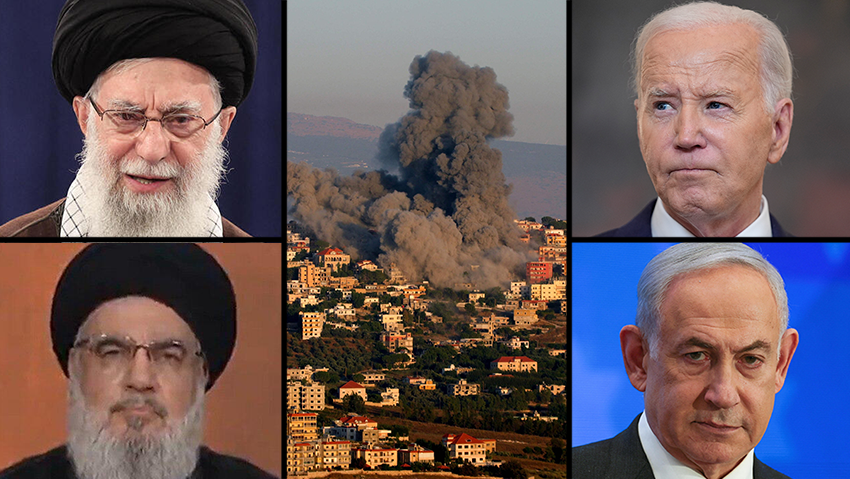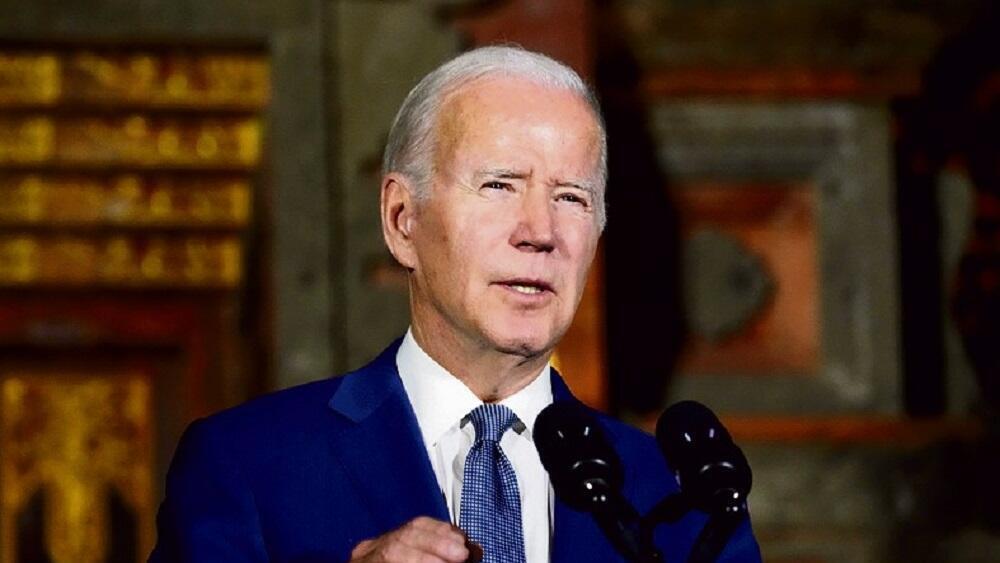Getting your Trinity Audio player ready...
Many analysts in the Middle East and elsewhere are wondering why the “punishment” promised by Iran and the Lebanese terrorist army Hezbollah has not materialized. These threats were made in the wake of the killings of the latter’s “chief of staff” Fuad Shukr and the Hamas leader Ismail Haniyeh (while he was in Tehran).
The answer is straightforward: Courtesy of the Biden administration, the mullahs and Hezbollah’s dire warnings proved more beneficial to these malign actors than an actual military retaliation.
The White House is horrified by the prospect of a regional flare-up in the Middle East which would likely involve U.S. forces and interests there, and could doom the Democrats’ chances in the upcoming elections.
Washington communicated its strong disinterest in a regional conflict both through indirect talks with Iran held in Oman as well as publicly. In return, the mullahs, through their Lebanese proxy, have intensified attacks on Israel’s north to unnerve Washington. The attacks are meant to drive home the message that unless a cease-fire in Gaza is reached promptly an all-out conflagration may be imminent.
Achieving a cease-fire in Gaza is without question a quintessential Iranian goal. The mullahs’ nightmare is for the IDF to eliminate Hamas – one of the components of the “ring of fire” they have erected around Israel aimed to confront it with multiple fronts – which would allow Israel to zero in on Hezbollah. Unsurprisingly, Hezbollah’s leader Hassan Nasrallah has repeatedly declared that ending the fighting in Gaza will also stop his terrorist army’s attacks on northern Israel and thus lead the IDF to forgo any planned offensive as a result.
Under the circumstances, it is almost certain that Iran’s warnings of a “severe punishment“ coming to Israel were meant primarily for Biden’s ears. And the Iranians took steps to underscore their threats as well. The Wall Street Journal on August 6 cited “unnamed U.S. officials,” as reporting that Iran was moving missile launchers and carrying out military exercises, “in a signal to the West that it is planning an attack in the coming days.”
4 View gallery


Ali Khamenei, Hassan Nasrallah, strike in Lebanon, Joe Biden, Benjamin Netanyahu
(Photo: REUTERS/Ronen Zvulun, Alex Kent / GETTY IMAGES, Rabih DAHER / AFP, Reuters)
Subsequently, it was reported by Axios on August 11 that Israeli Defense Minister Yoav Gallant warned his U.S. counterpart Lloyd Austin in a phone call that Iran was getting ready for a “large-scale attack.”
The Iranian message was received loud and clear in Washington. In response, Biden ordered a massive buildup of U.S. naval and air forces in the region. The aim is twofold – first signal to the Iranians that the U.S. is fully prepared to defend Israel in case of an attack. Second, make sure that if a bombardment does take place its impact would be limited so as to prevent Israel from going berserk and possibly igniting the entire region.
Simultaneously the Biden administration launched a full-scale diplomatic blitz to achieve a “comprehensive” deal that will include a cease-fire in Gaza and a hostage release.
By undertaking these two steps simultaneously Washington is “telling” Tehran that its promised punishment could not only fail but backfire by provoking a disproportionate Israeli response.
But, if the Iranians hold off they might actually achieve their main strategic goal – a cease-fire which would preserve their main regional proxy intact, not to mention their own oil industry and nuclear installations. That is a much more beneficial outcome compared to a pointless and potentially risky “revenge attack,” according to Washington.
To this end, the White House hurried to issue a statement on August 16 declaring that “[a] comprehensive cease-fire and hostage release deal [is] now in sight, no one in the region should take actions to undermine this process.”
With the Iranian-Hezbollah threats in its back, the Biden administration sensed a golden opportunity to renew its pressure on Israeli Prime Minister Binyamin Netanyahu to agree to a cease-fire. Biden is not only worried that war in the Middle East would target American soldiers stationed there – a scenario likely to hurt the Democratic ticket. His relentless pursuit of a “comprehensive deal” to “stabilize the region” is undoubtedly meant to boost the Democrats’ political standing by waving a “diplomatic achievement” equal to President Trump’s Abraham Accords once he is successful.
Yet there should be no mistake. In its urgent efforts to avert a regional conflict, the administration is in fact “dancing” to the “tunes” of the mullahs and Nasrallah. Whether by design or default a deal reached on Gaza that involves a prolonged cease-fire would be tantamount to paying ransom to political blackmailers to eschew their threats of violence. Israel’s security would be the main victim of such a capitulation.
Clearly, such an “achievement” would serve Biden, the mullahs and Nasrallah at Israel’s expense.
In fact, according to veteran Ynet journalist Ron Ben Yishai, U.S. Secretary of State Antony Blinken, in an apparent bid to assure the Democratic National Convention in Chicago that the administration was closing in on a deal, “mindlessly” divulged a key Israeli negotiating position vis-a-vis Hamas. Prime Minister Benjamin Netanyahu had communicated this information to him in secret.
What could the mullahs learn from their muscle-flexing exercise if Biden had his way?
First, their past April missile and drone attack might have been a tactical failure, but strategically it netted Tehran much credibility. In the wake of this assault, whose massive size and risk-taking propensity was anticipated by few, Iran’s fresh vows to severely punish the “Zionist aggressor“ were taken much more seriously. The Iranians and Nasrallah could thus claim the “fear and panic” among Israelis anticipating the attack was part of their promised retaliation and save face politically. Consequently, it could be expected that threats of military action by Iran would proliferate and its aggressive policies further escalated.
 Dr. Avigdor Haselkorn
Dr. Avigdor HaselkornFor example, Hezbollah’s large-scale August 25 “retribution” attack on Israel fits squarely into the basic blackmail plot directed at Biden and designed to block the IDF from crushing Hamas. Indeed in its wake Nasrallah not only tied the timing of the attack to the Gaza truce talks, claiming the response was “delayed” to give a chance to the ongoing cease-fire negotiations, but went on to declare the retaliation was a “preliminary“ step and further strikes may follow depending on the results being “satisfactory.”
The Hezbollah leader’s position amounts to a classic blackmail tactic. It is akin to hostage takers executing one of their captives as a testimony to the credibility of their threats in order to increase pressure on hostage negotiators to yield to their demands.
Coincidentally, the Iranians have continued to warn that “Iran’s reaction to the Israeli terrorist attack in Tehran is definitive,” and will be carried out “at a time and place” of its own choosing.
Second, the U.S. is ready to throw even its staunchest ally under the bus for political gain. This outcome is most likely during the American political season. Whenever the U.S. is in the grips of an election campaign, all bets may be off. Thus, timing is of the essence in plotting successful political blackmail of Washington.
- Dr. Avigdor Haselkorn is a strategic analyst who has published widely on national security issues.




